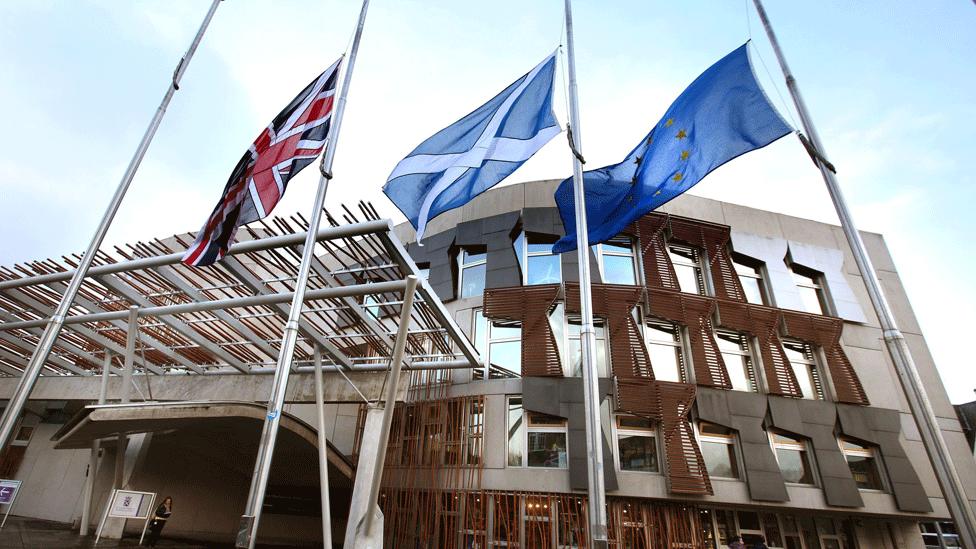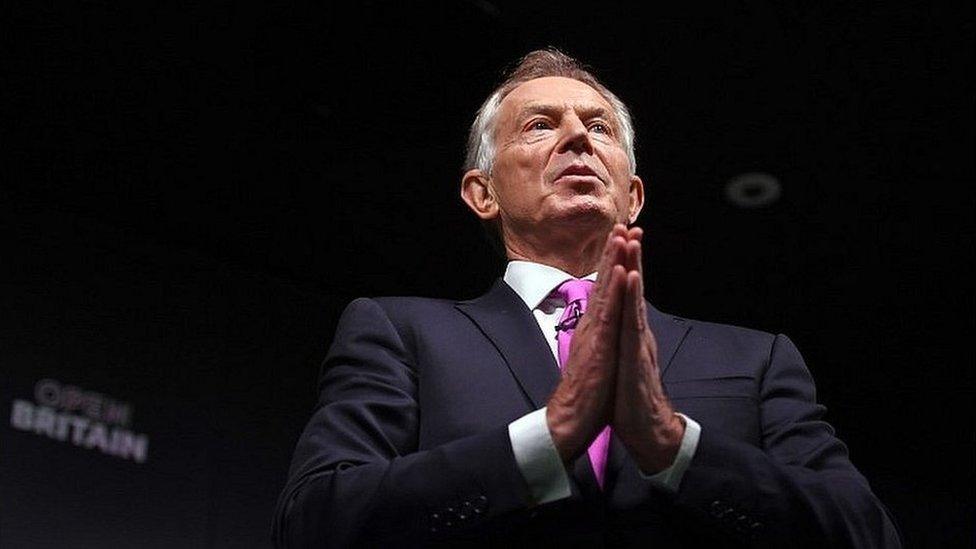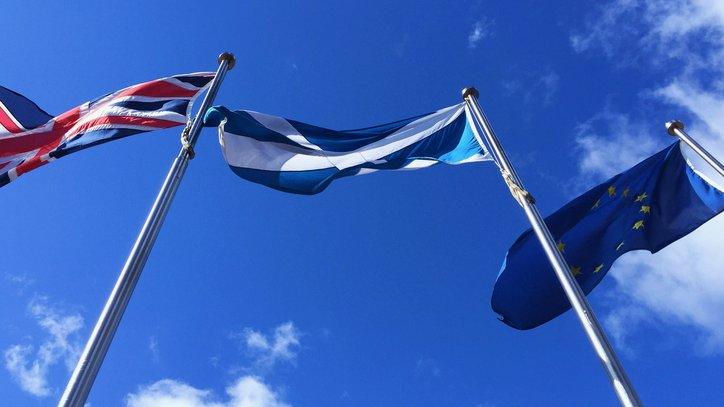Tony Blair says independence case is 'more credible' after Brexit
- Published
Tony Blair says the vote for Brexit has created a more credible context for Scottish independence
Former Prime Minister Tony Blair has said the context for the pro-Scottish independence case is "much more credible" after the Brexit vote.
During a speech he said the vote to leave the EU puts the break-up of the UK back on the table.
The former Labour PM argued that people voted without knowing the terms of leaving and therefore have a right to change their minds.
First Minister Nicola Sturgeon has said a second referendum is "very likely".
She told BBC Scotland that Mr Blair was "stating the obvious", adding that she believes the case for independence is "even more compelling" now than it was at the time of the 2014 referendum.
Tony Blair calls for people to 'rise up' against Brexit
The SNP argues that since a majority in Scotland voted to Remain, this represents a material change in circumstances sufficient to make the case for a second independence vote.
At the weekend, former first minister and SNP MP Alex Salmond indicated a decision on whether to hold a second referendum could come within weeks.
He said the UK government's response to Scottish plans to protect trade with Europe would be crucial.
Mr Salmond, the SNP's international affairs spokesman at Westminster, said a rejection of the plans would probably result in an autumn 2018 referendum.
Mr Blair, who was UK prime minister between 1997 and 2007, said in his speech to the pro-European campaign group Open Britain that those driving a withdrawal from the European Union "always wanted a hard Brexit".
He announced his "mission" to persuade Britons to "rise up" and change their minds on leaving the EU. He said there was "no widespread appetite" for the referendum result to be reversed, but added that he wanted to "build support for finding a way out from the present rush over the cliff's edge".

A second independence referendum could potentially leave Scots choosing between the EU and the UK
In relation to Scotland, he said: "In addition to all this, the possibility of the break-up of the UK - narrowly avoided by the result of the Scottish referendum - but now back on the table but this time with a context much more credible for the independence case.
"We are already seeing the de-stabilising impact of negotiation over border arrangements on the Northern Ireland peace process.
"None of this ignores the challenges the country faces which stoked the anger fuelling Brexit: those left behind by globalisation; the aftermath of the financial crisis; stagnant incomes for some families; and for sure the pressures posed by big increases in migration which make perfectly reasonable people anxious and feeling their anxiety unheard."
'Threat to the UK'
During a question and answer session following the speech, Mr Blair underlined that he was not in favour of independence.
He said: "On Scotland, let me be very clear. I want Scotland to remain in the UK. Even if Brexit goes ahead, I'm still in favour of Scotland remaining in the UK. And let's be very clear, Scotland's single market with England is of far greater importance to it economically than Scotland's interaction with the rest of Europe.
"However, I'm afraid that as we said during the referendum campaign - unlike the other side, we don't want to un-say the things we said - so when myself and John Major warned this would be a threat to the UK, we meant it. And it's true. And you can see that by the referendum coming back on the agenda."
SNP leader Ms Sturgeon told BBC Scotland that Mr Blair was "stating the obvious" about the case for independence.
She said: "The independence argument is now very different than it was in even 2014, and is even more compelling than it was in 2014.
"What Brexit has shown is that within the UK, Scotland's voice isn't listened to and doesn't appear to count for much. So the argument for taking control and taking charge of our own future, society and place in the world becomes ever more strong."
Scotland's only Labour MP, Ian Murray, told Good Morning Scotland the Brexit issue did not make the case for Scottish independence.
He said: "It [Brexit] certainly makes the grievance towards independence more credible now but I don't see the arguments of 2014 being any more credible now than they were then.
"The economic case is worse, certainly, than it was then. If you looked at the oil figures yesterday, in terms of it being a drain on the Treasury rather than it being an £8bn benefit to the Treasury, which was being promised."
Meanwhile the Scottish Conservatives said only a quarter of people in Scotland wanted another referendum now.
MSP John Lamont said: "The SNP has tried to use Brexit to muster support for separation. It has failed.
"That is because, as the majority of people in Scotland know, we solve none of the challenges of leaving the European Union by separating ourselves from our own union of nations."
- Published17 February 2017

- Published12 February 2017
